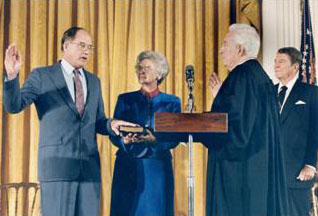Justices of the Supreme Court of the United States are required to take two oaths before they may execute the duties of their appointed office.
As noted below in Article VI, all federal officials must take an oath in support of the Constitution:
“The Senators and Representatives before mentioned, and the Members of the several State Legislatures, and all executive and judicial Officers, both of the United States and of the several States, shall be bound by Oath or Affirmation, to support this Constitution; but no religious Test shall ever be required as a Qualification to any Office or public Trust under the United States.”
The Constitution does not provide the wording for this oath, leaving that to the determination of Congress. From 1789 until 1861, this oath was, “I do solemnly swear (or affirm) that I will support the Constitution of the United States.” During the 1860s, this oath was altered several times before Congress settled on the text used today, which is set out at 5 U. S. C. § 3331. This oath is now taken
by all federal employees, other than the President:
“I, _________, do solemnly swear (or affirm) that I will support and defend the Constitution of the United States against all enemies, foreign and domestic; that I will bear true faith and allegiance to the same; that I take this obligation freely, without any mental reservation or purpose of evasion; and that I will well and faithfully discharge the duties of the office on which I am about to enter. So help me God.”
 |
| Richard Hofmeister, Smithsonian Institution |
Retiring Chief Justice Warren E. Burger (in robe) administers the Constitutional Oath to his successor, Associate Justice William H. Rehnquist, in the East Room of the White House. Mrs. Natalie Rehnquist holds the Bible while President Ronald Reagan looks on.
The origin of the second oath is found in the Judiciary Act of 1789, which reads “the justices of the Supreme Court, and the district judges, before they proceed to execute the duties of their respective offices” to take a second oath or affirmation. From 1789 to 1990, the original text
used for this oath (1 Stat. 76 § 8) was:
“I, _________, do solemnly swear or affirm that I will administer justice without respect to persons, and do equal right to the poor and to the rich, and that I will faithfully and impartially discharge and perform all the duties incumbent upon me as _________, according to the best of my abilities and understanding, agreeably to the constitution and laws of the United States. So help me God.”
In December 1990, the Judicial Improvements Act of 1990 replaced the phrase “according to the best of my abilities and understanding, agreeably to the Constitution" with "under the Constitution.” The revised Judicial Oath, found at 28 U. S. C. § 453, reads:
“I, _________, do solemnly swear (or affirm) that I will administer justice without respect to persons, and do equal right to the poor and to the rich, and that I will faithfully and impartially discharge and perform all the duties incumbent upon me as _________ under the Constitution and laws of the United States. So help me God.”
Upon occasion, appointees to the Supreme Court have taken a combined version of the two oaths, which reads:
“I, _________, do solemnly swear (or affirm) that I will administer justice without respect to persons, and do equal right to the poor and to the rich, and that I will faithfully and impartially discharge and perform all the duties incumbent upon me as _________ under the Constitution and laws of the United States; and that I will support and defend the Constitution of the United States against all enemies, foreign and domestic; that I will bear true faith and allegiance to the same; that I take this obligation freely, without any mental reservation or purpose of evasion; and that I will well and faithfully discharge the duties of the office on which I am about to enter. So help me God.”